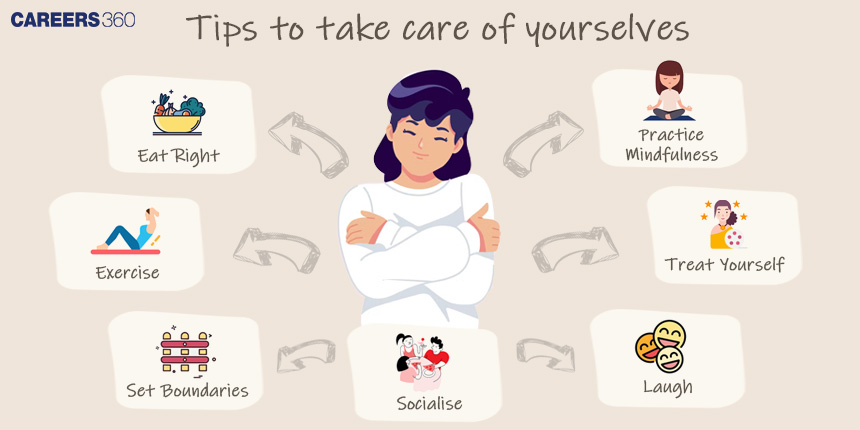Parenting
How Stay-At-Home Parents Can Care For Themselves

Synopsis
Stay at home parents, usually moms often are considered as doing not much than taking care of their children and the house, but this is a tough, round-the-clock thankless job. Hence, it becomes important that these primary caregivers and homemakers take time to care and nurture themselves as well. Keep reading to know how you can care for yourself too.

Synopsis
Stay at home parents, usually moms often are considered as doing not much than taking care of their children and the house, but this is a tough, round-the-clock thankless job. Hence, it becomes important that these primary caregivers and homemakers take time to care and nurture themselves as well. Keep reading to know how you can care for yourself too.
To begin with, let us first understand the concept of ‘stay-at-home’ parents (SAHP). Who is a Stay-At-Home Parent? A parent that remains at home while the other parent works outside the home is called a Stay-At-Home Parent. Being a SAHP or a caregiver can be one of the most fulfilling and rewarding experiences of your life and yet, it can be accompanied by feeling very drained and exhausted. Being a SAHP can be thankless, challenging and demanding on the individual, especially when your focus is predominantly on fulfilling the needs of others. The gamut of responsibilities include domestic chores, child rearing, cooking, taking care of elders, and everything else that needs attention at home including the plants and even the pets in many cases. Hence, as a stay-home-parent it is essential to take care of yourself, your needs in order to stay healthy, happy, emotionally afloat and give the best to your family in turn. Let us look at some of the physical, emotional, psychological benefits of self-care and some helpful tips to take care of yourself and thrive in this role.
Self-care has been defined as the process of establishing behaviours to ensure holistic well-being of oneself, to promote health, and to the active management of illness when it occurs.
Lack of self-care in terms of personal health, hygiene, living conditions is referred to as self-neglect and very often we find stay-at-home parents and caregivers guilty of this. They multitask and take care of unending needs of their family members but by the time it comes to themselves, their needs, they either have no energy or no motivation or enthusiasm to look after their own personal choices despite it sometimes being as simple as eating on time, exercising and getting enough and adequate rest.
Physical Benefits of Self-Care
Taking care of yourself has a very positive impact on your physical health which in turn helps with your emotional well-being. Unfortunately, in our culture we have never been trained to prioritise ourselves, and so self-care seems like a ‘western’ and an ‘alien’ concept to many stay-at-home parents, especially mothers. The individual is almost accused of being ‘selfish, arrogant and self- absorbed’ should they speak and engage in their needs first but, the truth is that this is all about self-preservation. People at home are able to get on with their lives, routines, jobs, commitments only because there is that one person who takes on the role of being their anchor, their back-bone, support system and if they do not take care of themselves, the entire system will, can and does collapse.
Also Read | Do You Sometimes Feel Guilty As A Parent? Cope With These 8 Ways
So, identify your ‘Golden Hour’ – the time that you can take out for yourself in the madness of living life in a 24 hour cycle, to nurture, revitalise and rejuvenate your own needs. Afterall, you cannot pour from a cup that is not full. When you prioritise self-care, you are more likely to eat a healthy diet, exercise regularly, and get enough sleep. These are non-negotiables to a healthy and happy you and this should never be a second choice! These habits also improve basic energy levels, boost your immune system, and reduce risks of chronic diseases such as obesity, diabetes, and heart disease. Additionally, taking care of yourself reduces the risk of injury and illness, and improves your overall quality of life.
Emotional Benefits of Self-Care
How are your emotions? Are you aware of what you feel and express your feelings to the significant people around you while maintaining healthy boundaries with realistic expectations?
 Taking care of yourself can have a positive impact on your psychological well-being.
Taking care of yourself can have a positive impact on your psychological well-being.
What is your communication style? What is the quality of your relationships and how are your conflict management skills? Do you enjoy your role as a stay-home-parent and does that identity fulfil your purpose or is it something that you are struggling with?
This checklist will determine if you engage in helpful, productive, proactive behaviours and prioritise yourself. If you are struggling, please do not shy away from getting professional help to set this balance right.
Self-care has a significant impact on your emotional well-being. When you take care of yourself, you are better able to manage your emotions, including anger, irritation, frustration, disappointments and sadness. You fearlessly communicate your needs and feelings to others, stay assertive and build healthy relationships. Setting clear boundaries with reasonable expectations makes your behaviour predictable. This helps in feeling more connected to yourself and others, and can lead to a greater sense of compassion and empathy.
Psychological Benefits of Self-Care
Taking care of yourself can have a positive impact on your psychological well-being. Taking ownership and responsibility of your thoughts, feelings and behaviour helps one become aware, accept the shortcomings and provides courage to take action to feel better. Affirming, positive self-talks ensures that you stay afloat and that helps maintain focus, improve motivation and cope with negativity. You are able to manage stress, mood swings, anxiety, and depression more effectively.
Self-care helps to improve your mood, increase your self-esteem, and boost your confidence. It can also lead to a greater sense of fulfilment and purpose in life. It helps you feel self-confident, appreciate your identity, feel loved, wanted, belonging and feel competent - the essentials of our self-esteem that can make anyone feel like a million bucks!
Also Read | Homeschooling: Are You Looking At It As An Option?
Tips To Take Care Of Yourselves
Eat Right: Fresh produce and fresh meals of seasonal fruits and vegetables that are easily accessible and available to you.
Prioritise Sleep: Get 6-8 hours of sleep each night, and establish a consistent sleep schedule.
Exercise: Get 30 minutes of exercise each day to reduce stress, improve your mood, and boost your energy levels.
Social Connections: Make time to connect with friends and family members, in person, over the phone, or online (in that order).
Set Boundaries: ‘No’ is a complete sentence. Set boundaries with a routine that includes time for self-care.
Laugh: Build the ability to laugh at yourself and find things that fill your heart with joy.
Hobbies and Interest: Learn a new skill every six months and keep growing and evolving.
Treat Yourself: Indulge in something every once in a while that makes you happy, whether it's a favourite food, a movie, a book, an outing.
Practice Mindfulness: To manage stress and anxiety, and improve your overall well-being.
Pranayama, Yoga, Meditation: Pick what you like but commit to something if you need to ‘s-l-o-w d-o-w-n’ a little.
Also Read | Innovative Technology Aided Solutions for Students with Learning Disabilities
Finally, research proves that if you get your daily D.O.S.E (Dopamine, Oxytocin, Serotonin and Endorphins) of these essential hormones via self-care, you will have a phenomenal impact on your overall health and well-being and also impact those around you. You will notice an improved mood, reduced stress and anxiety, energy levels at an all-time high and a deep sense of gratitude, fulfilment and purpose in life with meaningful relationships.
Author is a consultant counsellor, corporate trainer; and columnist with a leading English newspaper. She contributes to a successful weekly column on career guidance and choices. With years of experience in the field, Nandini is a guest faculty at many prestigious schools, colleges and training institutions. She is a hands-on parent to two teenagers.
Subscribe to Membership Plan
*Unlock all premium content and benefits:
Rate this Story
Latest Stories
List NEET 600 to 1000 rank Accepting Medical Colleges in India

Knowing the opening and closing ranks of NEET scores helps students to see if they can get into their preferred medical college. Colleges with big differences in ranks are easier to get into, while those with smaller differences are more competitive, so students need to consider their options carefully based on their NEET scores. Read this article to know about the list of NEET 600 to 1000 rank Accepting Medical Colleges in India and know their opening and closing NEET rank
By
5 min read ⋆ 2 May'24
KCET Cutoff 2024 - Check the previous year cutoff
10 min read ⋆ 30 Apr'24
NEET PG Bond: Service Bonds and Penalties for Different States
8 min read ⋆ 29 Apr'24
NEET PG Bond: Service Bonds and Penalties for Different States
8 min read ⋆ 29 Apr'24
Careers360 helping shape your Career for a better tomorrow
250M+
Students
30,000+
Colleges
500+
Exams
1500+
E-Books
